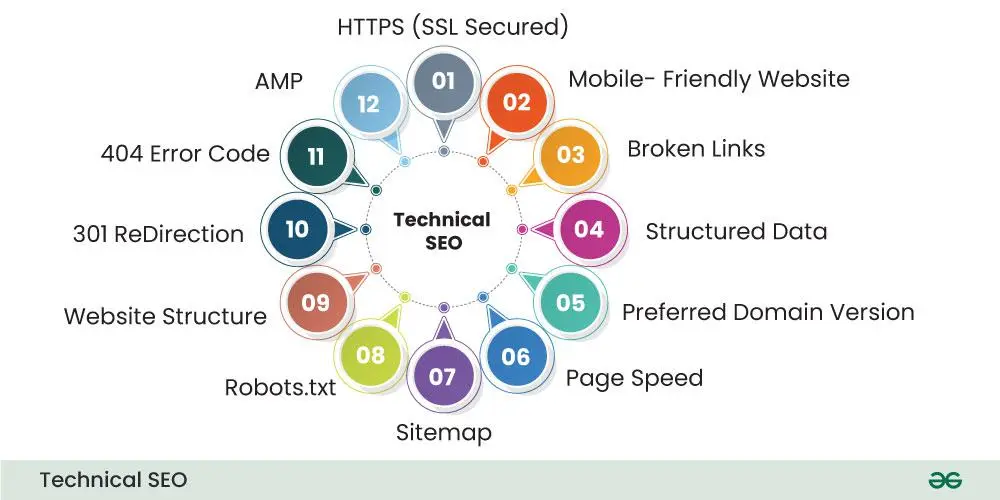Explore the essential components of technical SEO including site architecture, mobile-friendliness, page speed, and indexing. This comprehensive guide explains how technical SEO impacts rankings, visibility, and user experience. Suitable for developers, marketers, and website owners.
Technical SEO: The Foundation of High-Performing Websites
In the ever-evolving digital landscape, a solid technical SEO strategy ensures that your website is accessible, fast, and easy for search engines to understand. Without it, even the most compelling content can remain invisible to your target audience.
What is Technical SEO?
Technical SEO refers to optimizing your website’s infrastructure to help search engines crawl and index it more effectively. It includes improvements in speed, mobile responsiveness, secure connections, and site architecture—all of which influence search rankings.
Why Technical SEO is Crucial
A beautifully designed website and excellent content won’t matter if your pages aren’t being indexed or your site loads slowly. Technical SEO ensures that:
- Your site is crawlable and indexable
- Search engines understand your content
- Users enjoy a fast, smooth browsing experience
- You meet Google’s Core Web Vitals
Visit SEO Agency in India for expert technical SEO support.
Key Components of Technical SEO

1. Site Architecture and Navigation
- Flat site structure to minimize click depth
- XML sitemaps to guide search engines
- Proper internal linking with relevant anchor text
2. Mobile Optimization
- Responsive design
- Touch-friendly navigation
- Fast mobile load speeds
3. Page Speed and Core Web Vitals
- Optimize images and scripts
- Minify CSS, JavaScript, HTML
- Implement lazy loading
- Measure with Google PageSpeed Insights
4. Secure Website (HTTPS)
- Install an SSL certificate
- Update all internal links to use HTTPS
- Fix mixed content issues
5. Crawlability and Indexation
- Use robots.txt to guide bots
- Remove duplicate content with canonical tags
- Submit and maintain your XML sitemap
- Identify crawl errors using Google Search Console
6. Structured Data Markup
- Use Schema.org to help Google understand content
- Add rich snippets for reviews, FAQs, events, etc.
7. URL Optimization
- Use short, descriptive URLs
- Avoid dynamic parameters when possible
- Maintain consistency in case and structure
Explore SEO Offerings to see full-service technical SEO solutions.
Enhancements and Advanced Techniques
Server-Side Improvements
- Enable GZIP compression
- Leverage browser caching
- Use a reliable CDN (Content Delivery Network)
JavaScript SEO
- Ensure important content is not hidden by JS
- Use server-side rendering if needed
- Check rendering with Google Search Console’s Mobile-Friendly Test
Log File Analysis
- Analyze server logs to monitor crawling behavior
- Identify which pages are getting crawled or ignored
International SEO (Hreflang Tags)
- Use hreflang annotations to target multiple languages/regions
- Avoid duplicate content in international versions
Canonicalization Strategy
- Prevent indexing of duplicate pages
- Consolidate link equity with canonical tags
Common Technical SEO Mistakes
- Broken internal links
- Misconfigured canonical tags
- Overuse of JavaScript for content rendering
- Missing alt attributes on images
- Orphan pages not linked from anywhere
Avoiding these issues helps preserve your SEO performance and ensure a smooth experience for users and crawlers alike.
How to Audit Your Technical SEO
- Crawl Your Website – Use tools like Screaming Frog or Sitebulb
- Check Index Coverage – Google Search Console shows which pages are indexed
- Run Speed Tests – Google PageSpeed Insights or GTMetrix
- Validate Structured Data – Use Google’s Rich Results Test
- Monitor Crawl Stats – View Googlebot behavior in GSC
A proper technical SEO audit helps in identifying gaps and fixing them systematically.
Tools to Support Technical SEO
- Google Search Console
- Google PageSpeed Insights
- Screaming Frog SEO Spider
- Ahrefs Site Audit
- GTMetrix
- Cloudflare
- Yoast SEO or Rank Math (for WordPress)
Why Partner with a Technical SEO Agency
Choosing a reliable agency ensures that:
- Your website adheres to best practices
- Technical errors are resolved before they impact rankings
- Your platform is future-proof against Google algorithm updates
Contact SEO Agency in India to discuss how technical SEO can transform your site’s performance.
Case Study: E-commerce Site Speed Boost
A fashion e-commerce site reduced page load time from 5s to 1.8s by optimizing image delivery, removing unused scripts, and compressing CSS. Result: 35% boost in sales and 47% lower bounce rate.
FAQs About Technical SEO
1. What’s the difference between on-page and technical SEO?
On-page SEO deals with content and HTML elements; technical SEO focuses on backend optimizations for crawlability and speed.
2. How often should I perform a technical SEO audit?
It’s ideal to run a full technical audit quarterly or after any major site changes.
3. Is HTTPS a ranking factor?
Yes. Google considers secure sites (HTTPS) as a positive ranking signal.
4. Can I do technical SEO without coding knowledge?
Basic tasks like fixing broken links or submitting sitemaps don’t need coding, but advanced fixes often require developer support.
5. What’s the impact of Core Web Vitals?
Core Web Vitals influence rankings by measuring user experience factors like speed, interactivity, and layout stability.
Final Thoughts
Technical SEO is not a one-time task; it’s an ongoing process that supports the foundation of your entire SEO strategy. From crawlability and speed to structured data and secure protocols, technical health determines how well your site performs in the search ecosystem.
To get your technical SEO right, visit SEO Agency in India
References:



